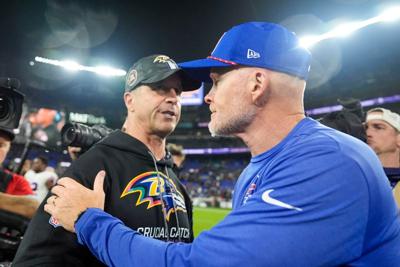Not much went right for the Buffalo Bills in their 35-10 loss in Baltimore on Sunday night. One of the few things that did was an unforced error by Ravens coach John Harbaugh.
The strange sequence ended up not meaning much when the Bills failed to take advantage of it. But it sounded the echoes of two other instances in Bills history when timeout gaffes by an opposing coach did lead to Buffalo wins.

Baltimore Ravens coach John Harbaugh, left, talks with Buffalo Bills coach Sean McDermott following their game Sunday, Sept. 29, 2024, in Baltimore. The Ravens won 35-10.
First, though, let's review Sunday's blunder.
The Bills had the ball near midfield approaching halftime. Ravens cornerback Marlon Humphrey broke up a Buffalo pass but was shaken up on the play. The Ravens had to take an injury timeout. Then, to set up his defense for a fourth-and-2, Harbaugh called another timeout.
Oops.
NFL rules do not allow teams to call consecutive timeouts. The Bills got a free first down on the 5-yard delay-of-game penalty. That could have been a big deal had the Bills managed to turn it into points, but the Ravens forced a punt three plays later.
People are also reading…
"I want that one back," Harbaugh told reporters after the game. "That was bad. I felt bad about it at the time. I still feel bad about it. I'm going to feel bad about it next year ŌĆö and 10 years from now I'm still going to hate it."
Imagine how much former Washington coach Joe Gibbs must still hate the mistakes he made against the Bills 17 years ago ŌĆö and 43 years ago. (These came during his two separate tours of duty in Washington.)
The Bills played at Washington in 2007 and trailed 16-14 in the final moments. Bills kicker Rian Lindell booted a 51-yard field goal in the rain that looked like the game winner, but Gibbs had called a timeout just before the snap. Then the Bills lined up for another tough 51-yarder ŌĆö and Gibbs called another timeout.
"We can't have consecutive timeouts. That's No. 1," referee Tony Corrente explained after the game. "No. 2, if that timeout is called to freeze the kicker, it becomes unsportsmanlike conduct."
That meant a 15-yard penalty, which meant Lindell's next kick was from 36 yards┬ĀŌĆō and he sailed it dead-center through the uprights. Bills, 17-16.
At first, in his postgame presser, Gibbs tried to place blame on the officials, but then accepted it for himself.
"I asked the official on the sideline, I asked, ŌĆśCan I call a second timeout?ŌĆÖ┬ĀŌĆØ Gibbs said. "It's something I shouldn't have done. I should have known (the rule). That's on me."
As was a game-changing penalty in 1981 that helped the Bills beat Washington in Orchard Park. Washington, trailing 21-14, had the ball at the Buffalo 45 in the third quarter. On third-and-7, Joe Theismann scrambled for a first down just as a penalty flag flew for clipping. Theismann lay motionless for several moments after being tackled by Charles Romes and Bill Simpson, and officials called an injury timeout.
Reserve quarterback Tom Flick replaced Theismann for third-and-22 at Washington's own 37. Then the center double-pumped┬ĀŌĆō a false start┬ĀŌĆō and officials blew the play dead just as Flick was setting up to pass. Theismann trotted back onto the field for third-and-27. He fired a pass that was deflected and then caught by Virgil Seay, who gained a wild 32 yards for an apparent first down.
But Bills defensive coordinator Tom Catlin squawked at the officials from the sideline. NFL rules stated that after an injury timeout, the player who was hurt had to sit out for at least one play. Catlin correctly argued there had been no play because a false start is a dead-ball penalty. The officials huddled up. And then, to the delight of the Buffalo crowd, they decided that Catlin was right.
The 32-yard gain was wiped out and a 5-yard penalty assessed for illegal procedure. Washington did not score again.
"The rules simply state the player has to leave for one play," Catlin said afterward. "Hell, all they had to do was count. There hadn't been a play. I wanted ŌĆÖem to call the press box if they weren't sure."
Gibbs complained that the officials should have stopped Theismann from coming onto the field if they knew he had not sat out for one official play.
"Their sideline caught it," Gibbs said ruefully of the Bills.
That victory allowed Buffalo to stay in the playoff race. The Bills finished 10-6 and beat the New York Jets in the wild-card round 31-27, but then lost at Cincinnati in the divisional round 28-21. The key moment was a controversial delay-of-game penalty that negated a Bills' first down deep in Bengals territory in the closing minutes.
Live by the flag, die by the flag.



















